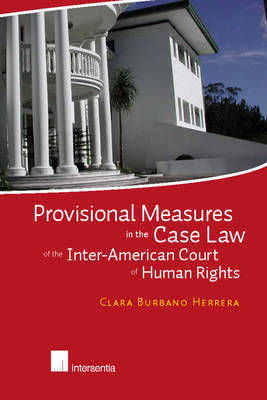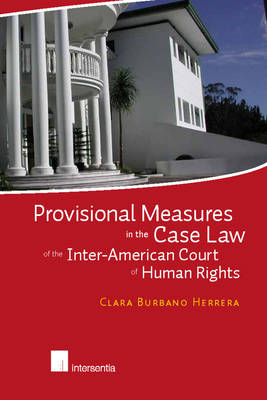
- Afhalen na 1 uur in een winkel met voorraad
- Gratis thuislevering in België vanaf € 30
- Ruim aanbod met 7 miljoen producten
- Afhalen na 1 uur in een winkel met voorraad
- Gratis thuislevering in België vanaf € 30
- Ruim aanbod met 7 miljoen producten
Zoeken
Provisional Measures in the Case Law of the Inter-American Court of Human Rights
Clara Burbano Herrera
Paperback | Engels
€ 49,00
+ 98 punten
Omschrijving
Provisional measures are instruments used by the Inter-American Court of Human Rights. Their purpose is to prevent irreparable harm to the rights and freedoms ensured, under the American Convention on Human Rights, of persons who are in a situation of extreme gravity and urgency. The measures, ordered ex officio or at the request of a party, result in protection offered by the respondent State to alleged victims. Those can include family members of alleged victims, witnesses, journalists, political candidates, human rights defenders, members of indigenous communities, prisoners who live in deplorable conditions, the seriously ill or those on hunger strikes, officials of the justice system, aliens under orders of deportation or extradition, and those sentenced to capital punishment. This does not in any way result in prejudging the merits of the matter before the Inter-American Court. Today, interim measures have a key role in many of the cases that are brought before the Inter-American Human Rights System. Surely, neither the judges, academia, nor the international community in general had imagined the dimensions that this institution would acquire in the jurisprudence over the years. This book analyzes the complete case-law of the Inter-American Court of Human Rights with regard to provisional measures. It deals with the jurisdiction of the Court - ratione personae, materiae, temporis, and loci - to order such measures and the admissibility questions respectively. This is followed by an analysis of the evidentiary issues, the processing of the request for provisional measures, the delay within which interim measures are usually adopted by the Court, and the duration of the measures. Finally, the legal nature of the provisional measures and the legal consequences in case of incompliance by States are examined, as well as the compliance rate and the factors that may be considered the main obstacles to some measures being effective. This study exalts the work of the measures and explores responses so that they might better meet their function of protecting rights effectively. Beyond its academic value, the book has a practical utility - a social visibility. It is an invitation to each individual to get acquainted with the power that the case law of the Inter-American Court has given to the figure of interim measures, which, as a useful tool, has the virtue of avoiding the irreparable violation of rights in situations of extreme gravity and urgency.
Specificaties
Betrokkenen
- Auteur(s):
- Uitgeverij:
Inhoud
- Aantal bladzijden:
- 228
- Taal:
- Engels
Eigenschappen
- Productcode (EAN):
- 9789400000377
- Verschijningsdatum:
- 15/04/2010
- Uitvoering:
- Paperback
- Formaat:
- Trade paperback (VS)
- Afmetingen:
- 165 mm x 235 mm
- Gewicht:
- 435 g

Alleen bij Standaard Boekhandel
+ 98 punten op je klantenkaart van Standaard Boekhandel
Beoordelingen
We publiceren alleen reviews die voldoen aan de voorwaarden voor reviews. Bekijk onze voorwaarden voor reviews.











